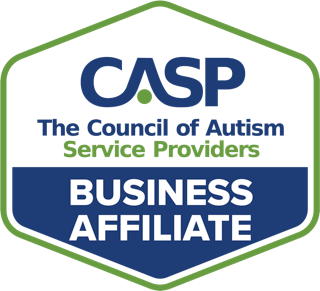It seems so simple. ABA (Applied Behavior Analysis) professionals want the best possible outcomes for their clients. Families of individuals with autism spectrum disorder (ASD) want their kids to thrive and succeed. And yet challenges can arise between families and clinicians that significantly impact the success of treatment programs.
That’s where compassion comes in. A simple concept with a profound impact, it’s a crucial tool for fostering effective collaboration and illuminating the unique emotional journeys, stressors and burdens that families face.
In a conversation from our Next Guest webinar series, Dr. Kate Fiske, Founder and Director of North Star Family Autism Center and Dr. Bridget Taylor, founder and CEO of Alpine Learning Group and Rethink BH’s Senior Clinical Advisor, offered seven easy ways for ABA professionals to infuse compassion into their practices.
1. Recognize the Emotional Roller Coaster
No two families are alike but the emotional experiences are so similar.
Dr. Fiske Tweet this
For families, the diagnosis of autism is often a life-altering event that can trigger a range of intense emotions. Parents may experience grief, anger, guilt, relief – sometimes all at once. And it’s not just during the time of diagnosis. These emotions can resurface at various stages throughout a child’s development:
- Transitions to new schools
- Birthdays and other milestones
- Reaching adulthood
Being mindful of a family’s emotional journey on any given day helps to strengthen trust and build partnership.
2. Acknowledge the Stress Behind the Scenes
Recognize that those resurgences of grief and stress can happen on any day … it's not necessarily your relationship with the [family] but there may be other things going on for them emotionally.
Dr. Fiske Tweet this
When you encounter someone who is tense, anxious or irritated, it’s easy to misidentify yourself as the cause. It’s important to remember that families of individuals with ASD often experience heightened levels of stress due to factors like:
- the severity of their child’s symptoms
- the level of challenging behaviors
- the amount of care required
There may be other related or unrelated stressors they are grappling with such as:
- financial concerns
- relationship strain
- challenges with siblings or other family members
Remembering these potential sources of stress can help professionals approach families with greater empathy and understanding.
3. Listen Without Judgment
One of the most compassionate behaviors professionals can exhibit is simply listening and validating a family’s experiences. Providing a non-judgmental space for them to share their concerns, fears and emotions, can be incredibly meaningful for parents, especially when their support networks may be limited. Validation goes a long way in building a trusting, collaborative relationship.
4. Build Bridges for Families
‘How can we better connect families with one another?’ is one of the charges that I put to ABA professionals.
Dr. Fiske Tweet this
Social support has been shown to significantly reduce stress levels for families of individuals with ASD. ABA professionals can play a crucial role by connecting families with those in similar situations. Examples include:
- support groups
- online communities
- local events
These opportunities for connection can help combat feelings of isolation and provide a much-needed sense of understanding and belonging.
5. Collaborate on Goals and Strategies
Aligning treatment goals and strategies with the family’s values, priorities and cultural context is key for effective collaboration. When professionals adopt a compassionate and curious approach, it allows them to better understand the family’s perspective and work together toward mutually agreed-upon objectives. Keeping the lines of communication open and being willing to compromise also helps bridge gaps and ensure that interventions are meaningful and sustainable.
6. Prioritize Rapport-Building
Building rapport with families is essential for fostering trust and ensuring successful collaboration. This can be achieved by:
- showing genuine interest in the family’s life beyond the child’s diagnosis
- remembering personal details
- celebrating small successes and joyful moments
Taking the time to share a positive anecdote about the child’s progress or a humorous interaction can help create a more positive and compassionate atmosphere.
7. Advocate for Support and Resources
Professionals can play a vital role in advocating for families and connecting them with appropriate support services. It may alleviate some of the stress and burdens families face to receive a referral for:
- mental health counseling
- parent support groups
- community resources
By recognizing when a family may be experiencing extraordinary challenges, professionals can provide timely and compassionate support.
Learn More about Building Compassion into Your Practice
The bottom line: bringing compassion into the parent-professional relationship can boost collaboration, improve treatment outcomes and create a more positive experience for everyone involved.
To learn more on this topic, we invite you to watch our webinar “Building Compassion in Collaboration with the families of Individuals with Autism Spectrum Disorder” presented by Dr. Kate Fiske and Dr. Bridget Taylor. This engaging discussion provides valuable insights and practical strategies for professionals working in autism treatment and ABA (Applied Behavior Analysis) therapy.
About This Webinar
This webinar is eligible for 1 Supervision CE. (Recorded)
Learning Objectives
In this webinar, Dr. Kate Fiske and Dr. Bridget Taylor will:
- Discuss the toll that raising a child with autism can have on the mental health and emotional well-being of parents and caregivers, as well as its impact on parent involvement in their child’s treatment
- Share compassionate steps all professionals can take in working with family members to reduce parent stress and build effective, collaborative relationships
- Review the current state of research and training on compassion in the field of autism treatment, and discuss initiatives that will further advance our understanding of the benefits of compassion with this population
About the Speakers

Dr. Kate Fiske, PhD, BCBA-D
Founder and Director at North Star Family Autism Center
Dr. Kate Fiske is the Founder and Director of North Star Family Autism Center. She is a licensed psychologist and board certified behavior analyst, and completed her doctorate in clinical psychology at Rutgers University-New Brunswick. She has worked in the field of ASD treatment for over 20 years, providing evidence-based services in skill acquisition and behavior reduction in inpatient, outpatient, and school settings. Dr. Fiske’s clinical interests center on providing psychotherapy for individuals with ASD and their caregivers. She has authored numerous chapters and journal articles on the treatment of children with ASD and their families, and is the author of the book, Autism and the Family: Understanding and Supporting Parents and Siblings.










